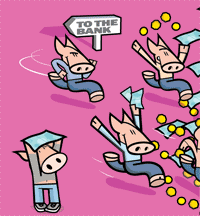 Run On The BankWe’ve all heard that expression... A few years ago, it really happened: that was Northern Rock. Much more recently, of course, we’ve had problems with numerous banks: RBS, Natwest, HSBC, Lloyds. And while there wasn’t as dramatic a run on these banks, an awful lot of people decided they’d had enough of the banks’ behaviour and withdrew literally billions of pounds and placed the money elsewhere. ‘Your Money or Your Life!’As if in one motion, the crowd, now larger, angrier and dustier, run towards the bank, shouting “Give us our money. We want out money!” They surge up the Bank’s steps and flood the banking hall, where the clerks cower behind their iron clad tills. “Give us our money - or we’ll shoot!” Short of CashWell, this wasn’t quite the scene in our high streets outside the banks. But, in essence, the story was the same. News was circulating that the banks were in crisis. UK, Ireland, Spain, Greece, Italy, USA. It was so bad that even the banks were finding it difficult to borrow money from each other. The banks didn’t trust one another! Banks borrowing from banks is how they finance their business. Their business is, basically, taking in money and putting it in savings accounts giving the savers interest on their money, and then lending that money to people and companies at a higher rate of interest, thus making a profit. But, with money in short supply, and confidence in banks at an all-time low, banks were finding it difficult to borrow. News got around that they were short of cash, and just as they did in the Old West, people panicked. A run on some banks started - people were turning up at the bank and demanding to have the money from their savings accounts. In cash! Bad News?This was not good news for banks - or for us. Whilst banks have assets (all the things they own), it was still not good news. Banks survive on trust. At least we thought so until recently. We all believed that banks were safe places for our money. Not any more!!  The Bank of England to the Rescue! The panic became so intense that the Bank of England and the British Government had to step in and bail out the banks. They could not allow the big banks - and they really were the big banks - to fail. That’s why, today, Royal Bank of Scotland, Natwest and Lloyds are actually mostly owned by the tax payers of Great Britain. That’s enough - everybody off!Until the Government decided to get tough. And the Bank of England got tough. And everyone got tough. And the banks were told that unless they lent out some of their cash - now - there would be serious trouble. So very grudgingly, the banks agreed, and started to turn on the tap of money again, so that companies could borrow some much needed cash. Greed is not good!And then, scandal hit the banks! Banks were accused of charging too much for their fees. And mis-selling financial products. That is they induced people to invest in or buy into financial programmes that were either wholly unsuitable for that person or completely unnecessary. Then they were accused of paying some of their staff too much - not the tellers we see in the banks toiling away each day. No, the bosses and the big investment bankers. And then… they were accused of rigging the Libor rates. That means the banks were fixing the rates on interest they charged themselves so as to give themselves an advantage at the cost of the poor old customers. Confused? Exactly. |
| Home | City Talk | The Biz of Showbiz | Go to my FSE | About | Contact |
|
 |
| © 2006-2012 Piggybank Multimedia Limited, Under Licence. All Rights Reserved. Terms & Conditions | Website custom developed by Netfactors, London |











